|
(轉載2021年文章)Where did Singapore's Ministers Study? |
 高級架構工程師 十八級 |
From secondary school to university, this issue illustrates the educational background of Singapore’s 34 ministers (as of 2021) in eight charts and figures.
|
 高級架構工程師 十八級 |
|
 高級架構工程師 十八級 |
In this issue:
How elite are the elite institutions of Singapore?
Which three junior colleges produced the majority of Singapore's ministers?
What is the most commonly studied degree subject among ministers — and what is the most uncommon?
How prevalent is an overseas education among ministers? And how many went to Oxbridge?
|
 高級架構工程師 十八級 |
The Elite Institutions of Singapore 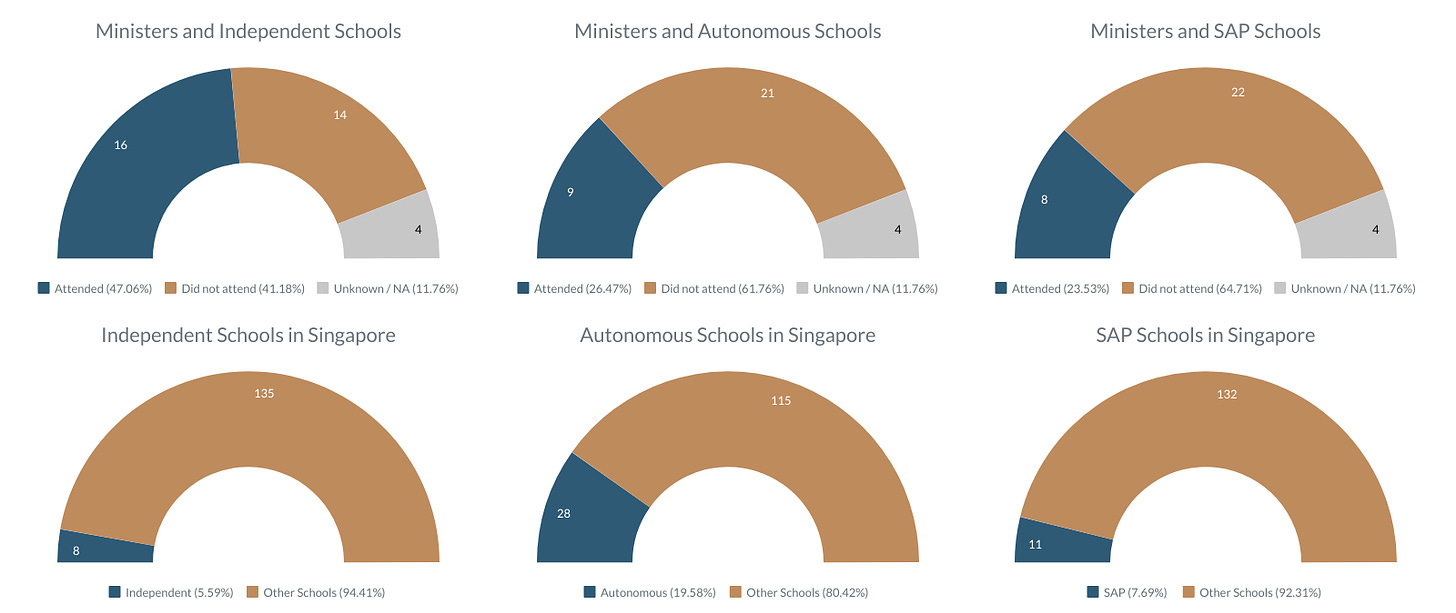 Source on secondary school types: 2020 Secondary School Posting Booklet(which includes information on 143 secondary schools, but excludes schools for which S1 posting is not a part of the admissions process, i.e. Singapore Sports School). |
 高級架構工程師 十八級 |
While Independent and Special Assistance Programme (SAP) schools form a small minority of the secondary schools which exist in Singapore, a majority of ministers (23 out of 34) were educated in SAP or Independent schools.
|
 高級架構工程師 十八級 |
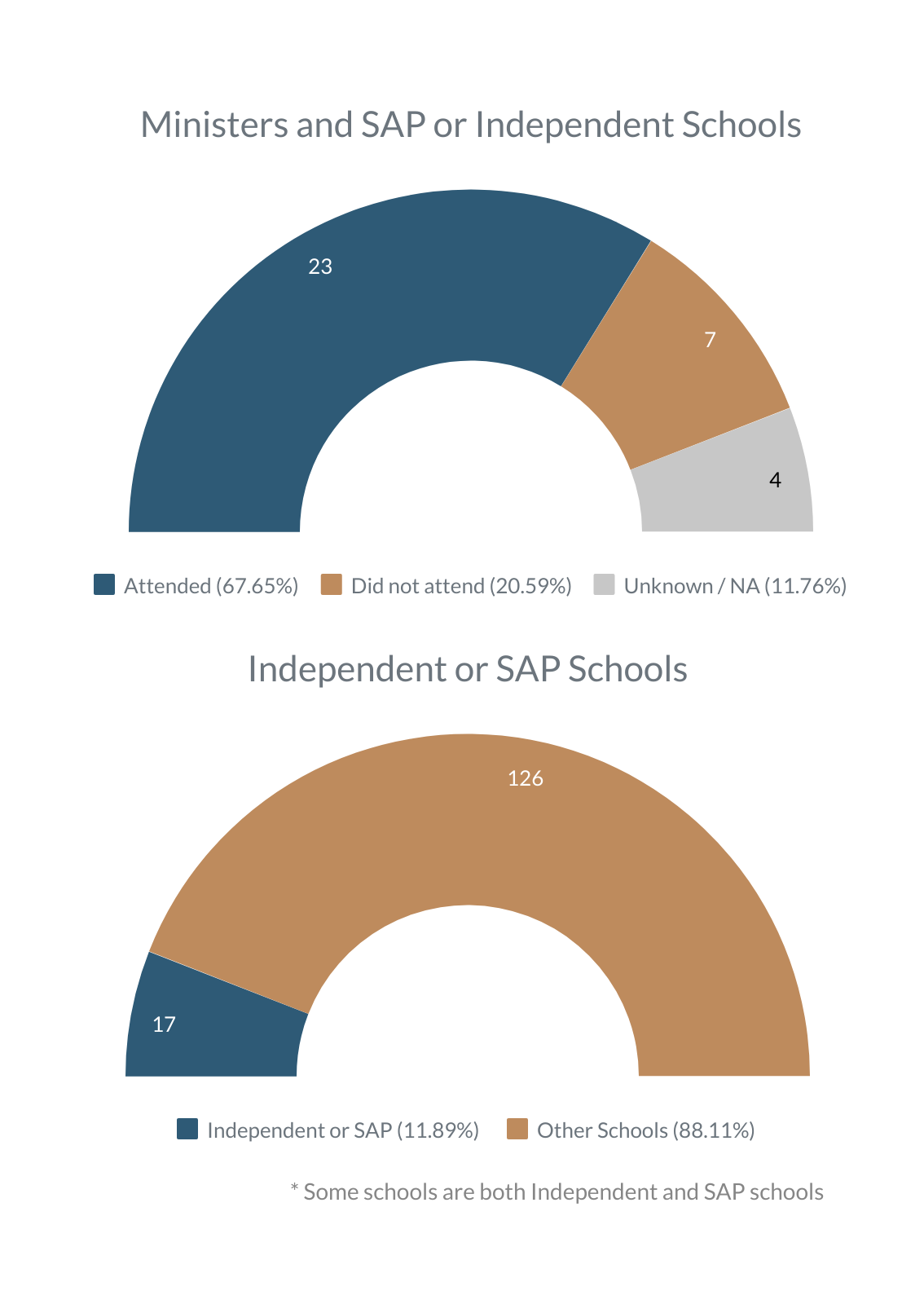 Note that schools can be categorised under multiple categories (autonomous and SAP, independent and SAP).
|
 高級架構工程師 十八級 |
SAP schools have a distinct focus on bilingual education in English and Mandarin Chinese. As recently as 2019, the importance of SAP schools was again emphasised by then-Minister of Education Ong Ye Kung, who pointed to the growing importance of China and the Chinese language. However, criticism has been levelled at the programme for being ethnically-exclusive and elitist in nature, considering Singapore's large non-Chinese minority.
Independent schools "have the flexibility to set their own fees and develop their academic and non-academic programmes". For Singapore Citizens, the school fees amount to $300-$600/month, while the monthly school fee for government (including autonomous) schools amounts to $25-$43/month (with an additional fee for autonomous schools).
Based on 2020 Primary School Leaving Exams (PSLE) admission cut-off points, 6 out of 11 SAP schools were in the 20 options with the highest cut-off points. Meanwhile, all 8 independent schools were among the 20 options with the highest cut-off points.
|
 高級架構工程師 十八級 |
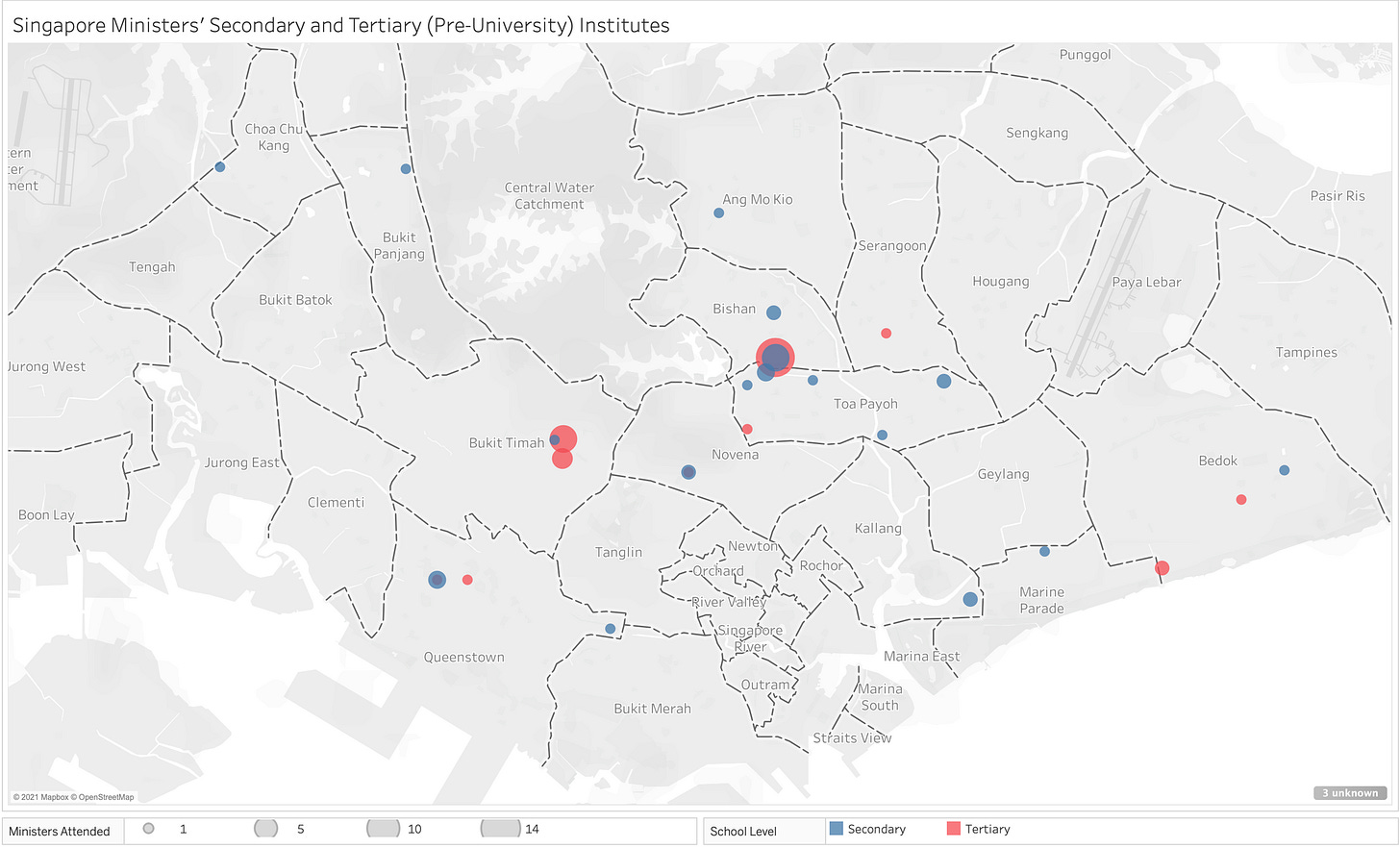 Note: The most recent iterations of each minister's schools are used in this article.
|
 高級架構工程師 十八級 |
These elite institutions are not only more exclusive, they are also concentrated geographically: all Independent schools and all but two SAP schools (Nan Hua and Nan Chiau) are located in Central and South Singapore. A similar pattern can be seen in the schools attended by ministers.
Why does location matter? A study of 40 years of junior college yearbooks from 6 junior colleges indicated that a neighbourhood’s characteristics could potentially explain why some groups are under-represented in Singapore’s top junior colleges:
"We found that ethnicity and gender matter in different ways. For female students, attending an elite junior college in a wealthy neighborhood is associated with wealthy neighborhoods having a disproportionate number of elite girls’ secondary schools that feed enrollment into the junior colleges. By contrast, for Malays, not attending an elite junior college in a wealthy neighborhood has more to do with Malays being underrepresented in wealthy neighborhoods." (Chua, Swee & Wellman, 2019)
|
 高級架構工程師 十八級 |
Most Ministers attend one of three Junior Colleges 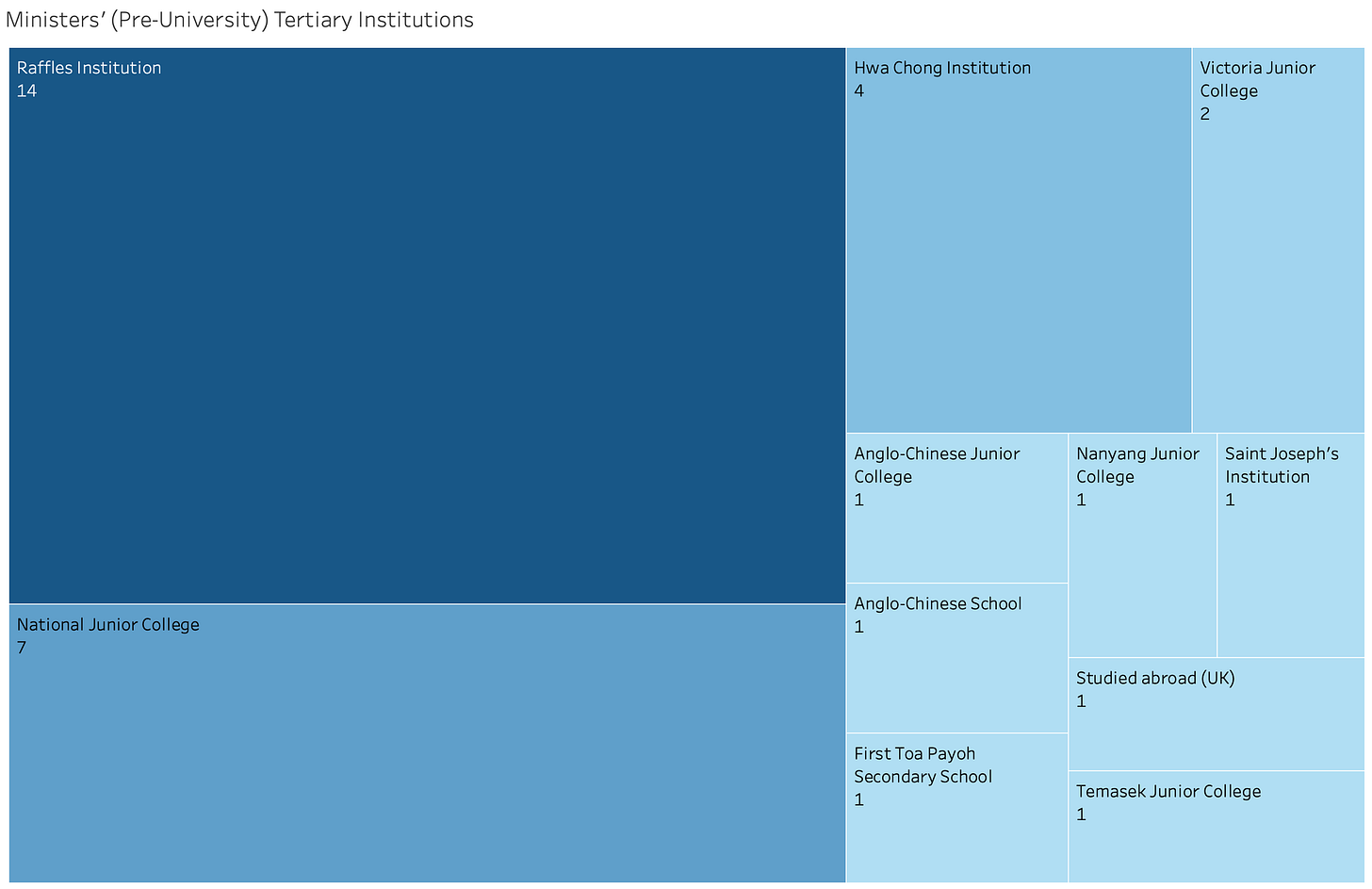 |
 高級架構工程師 十八級 |
The majority of ministers (24 out of 34) studied at one of three tertiary institutions: Raffles Institution, National Junior College or Hwa Chong Institution. Despite attempts to shed the image of being an 'elite school', Singapore's oldest school (Raffles) remains the school of choice among Singapore's leaders.
For more stories on Singapore's internet, press and government, subscribe to receive email updates with each new issue's release.
|
 高級架構工程師 十八級 |
Singapore's Fixation with Oxbridge
Ministers’ most commonly attended universities are the National University of Singapore, Harvard University and the University of Cambridge.
In line with Singapore's national fixation with Oxbridge and the Ivy League, 13 out of 34 ministers have studied at these universities. However, this number falls to 8 when we exclude postgraduate studies at the Harvard Kennedy School — which has drawn some controversy over its admission requirements and graduates.
This figure (about 38% of Singapore ministers have studied at Oxbridge or the Ivy League) is not far from that of British politicians: In 2019, 57% of the British Cabinet and 36% of Junior Ministers studied at Oxford or Cambridge. What is striking however is our attainment of a similar figure despite being a continent away from the US and the UK.
|
 高級架構工程師 十八級 |
Running Singapore like a Business  Note: many ministers studied multiple degree subjects.The three most common degree subjects are economics, business and public policy / administration. All public policy / administration degrees were conferred by the Harvard Kennedy School. Notably, no minister has a university-level degree focusing on the humanities. The closest is Senior Minister of State Sim Ann’s Bachelor’s Degree in Philosophy, Politics and Economics. To be clear, the marginalisation of the humanities is not unique to Singapore, with the humanities suffering from shrinking sources of funding and decreased attendance worldwide. In the US, the percentage of all new graduates with a bachelor’s degree in the humanities was 11.9% in 2015, the lowest percentage ever recorded. In Singapore, 17.9% of new graduates who completed their bachelor’s degree in 2020 did so in the humanities or social sciences (as data specific to the humanities is not available, the actual percentage of students who graduated with a degree in the humanities is likely to be much lower). Every ministry has at least one minister with a background in economics or business studies. Even the Ministry of Culture, Community and Youth is led by three ministers who studied law, business studies, economics, and public policy. Here, our emphasis on economic expertise over other forms of expertise becomes more readily apparent. |
 高級架構工程師 十八級 |
Singapore and the West 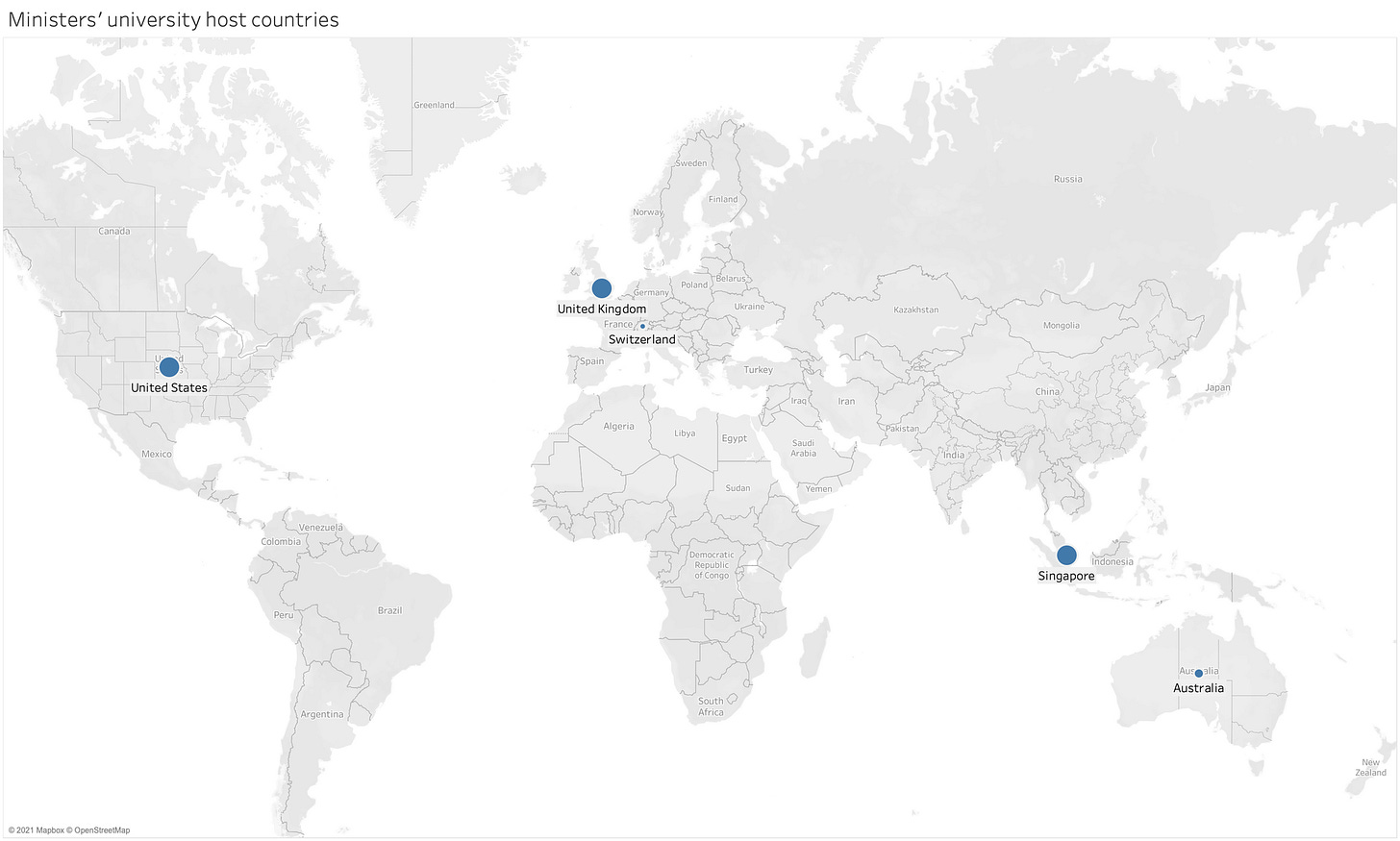 27 out of 34 ministers completed at least part of their university studies abroad. Ministers studied in a total of five host countries: Singapore (18), United States (18), United Kingdom (18), Australia (3) and Switzerland (1). 7 out of the 18 who studied in Singapore spent the entirety of their time in university there. Note that this figure does not include exchange semesters. Despite the rise of China and the growing importance of alternatives to a US-led world order, the educational background of Singapore’s ministers — on the surface level, at least — points strongly to alignment with the anglophone West. |
 高級架構工程師 十八級 |
A Master's-Level Degree as the Standard 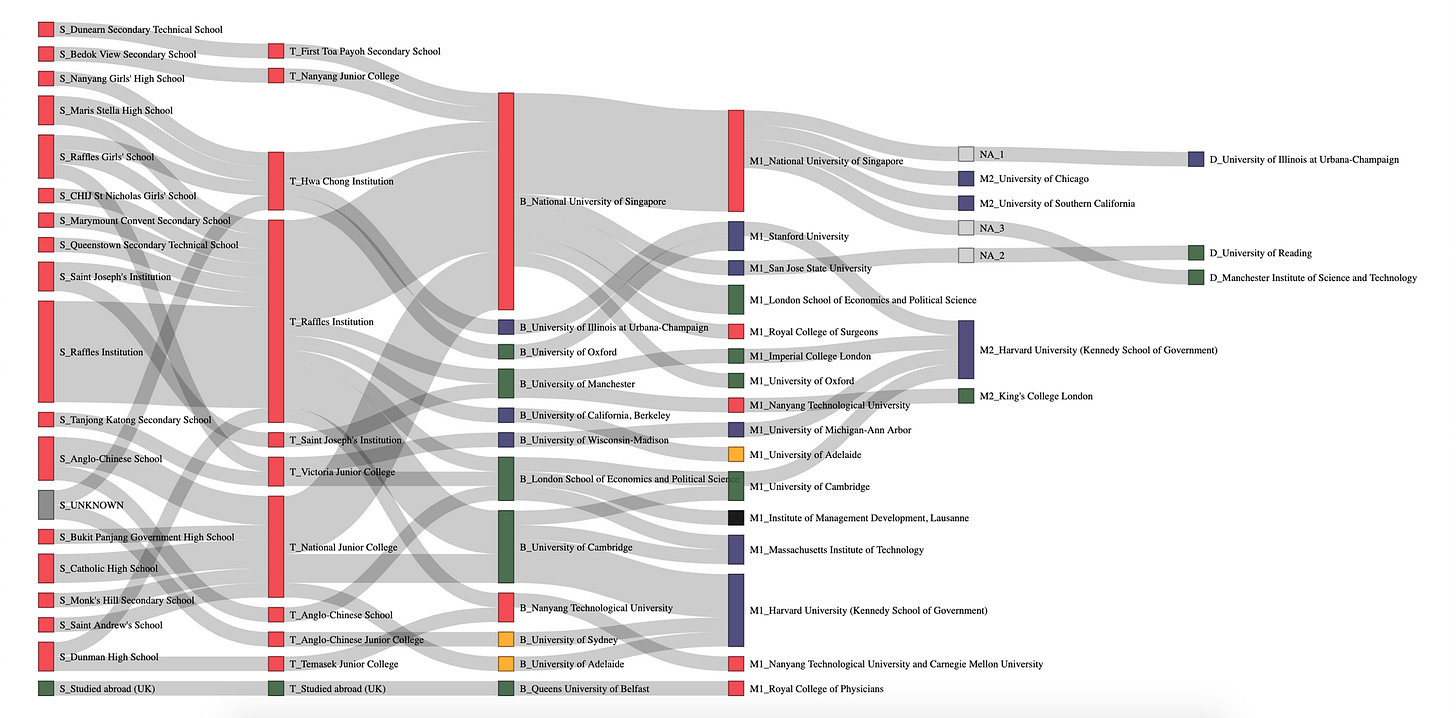 Credit: this data visualisation was developed by Hunter McGuireBetween them, Singapore’s ministers have an average of 2.2 degrees each. While 3 out of 34 hold a doctorate-level degree, only 4 out of 34 did not possess a master’s-level degree. At least 15 ministers received scholarships for their university studies. Click on this link or the image above to see a full visual representation of where ministers studied. How does this compare to the general population? According to the World Bank, as of 2018, 31.5% of Singapore’s population aged 25+ have attained at least a Bachelor’s degree, whereas 100% of ministers have. Specific data regarding the percentage of the general population with a master's degree is not available. Paststatements by ministers indicate that aim is to have 30 to 40 percent of a cohort of students graduate with a university degree. |
 高級架構工程師 十八級 |
What makes a typical minister? 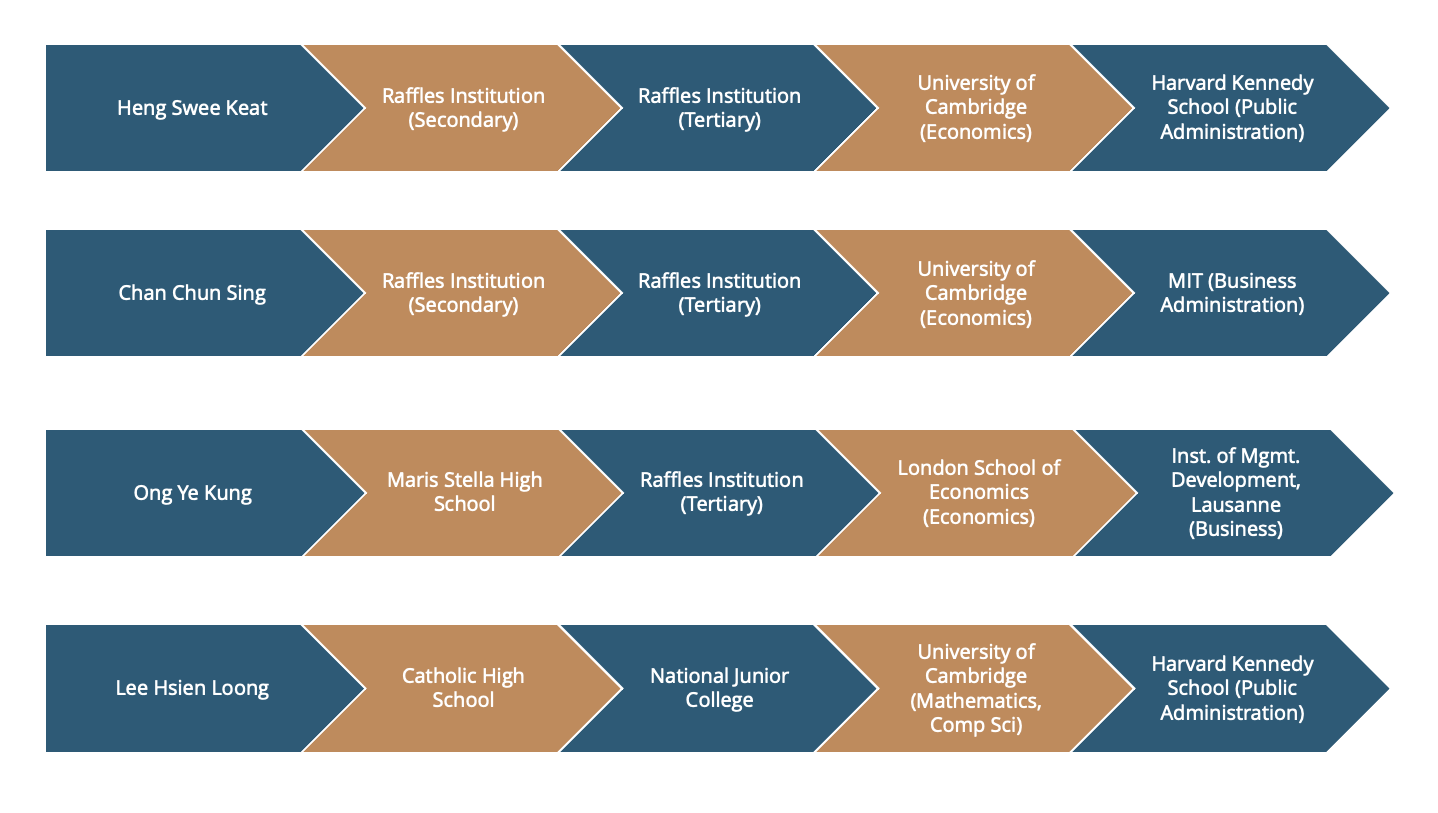 PM Lee and his potential successors (as of 2018)A typical minister is one who has: Studied at an Independent or SAP secondary school Progressed to Raffles, National JC or Hwa Chong for their tertiary studies Studied economics or business as an undergraduate Gained a postgraduate degree, most commonly at the Harvard Kennedy School Incidentally, the above also describes Deputy Prime Minister Heng Swee Keat’s educational background to a tee. Perhaps it is fitting then that Heng was the favoured candidate for the role of future Prime Minister by the PAP rank and file. It is important to note that educational background is only one part of what constitutes a member of Singapore's political elite. At the very least, however, these points provide an indication of what is valued at the highest level of government — and what meritocracy means in Singapore. |
 高級架構工程師 十八級 |
Corrections: Minister Lawrence Wong's postgraduate institution was incorrectly indicated as University of Wisconsin-Madison instead of University of Michigan-Ann Arbor. Minister Sun Xueling's tertiary education, which was previously indicated as unknown, is now indicated as Raffles Institution.
For more stories on Singapore's internet, press and government, subscribe to receive email updates with each new issue's release. If you have any comments, enquiries or corrections, please send them to teokaixiang@protonmail.com.
|
 高級架構工程師 十八級 |
A Note on this Story's Data Source: All data on Ministers' educational backgrounds was gathered from parliament profiles, government websites and media reports. Download the data: A full spreadsheet of each minister, their educational background and the sources used to verify this data can be found here. My data has some missing information: Alvin Tan and Tan Kiat How’s secondary-level institutions are not included; as this information could not be independently verified. Janil Puthucheary’s secondary and tertiary-level institutions, both outside of Singapore, were also excluded. A reason for this missing data is the change to how members of parliament’s data is presented to the public on government websites. Prior to 2015, parliament.gov.sg presented detailed information about a minister’s CV (most of which is still available via the Internet Archive). This information is no longer available post-2015 and as a result, information on the qualifications of members of parliament has become more difficult for the public to access: 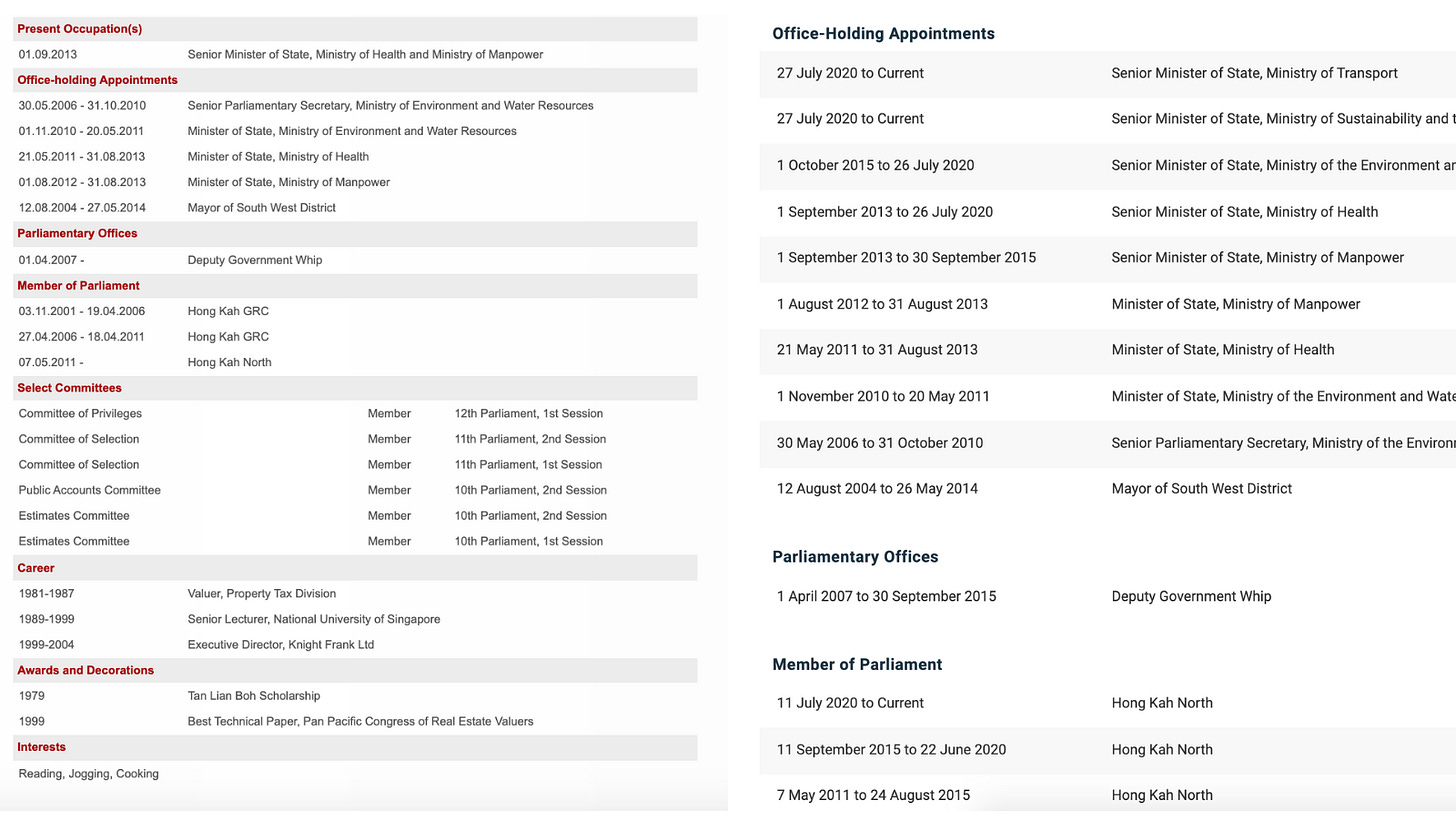 Member of parliament profiles pre-2015 (left) and post-2015 (right) |
 高級架構工程師 十八級 |
Barring changes to the way MPs’ backgrounds are presented to the public, comprehensive analyses of our current elected representatives by their professional backgrounds, educational backgrounds, scholarships received and other such biodata would be unfeasible or very time-intensive.
|
 高級架構工程師 十八級 |
|
 高級架構工程師 十八級 |
From secondary school to university, this issue illustrates the educational background of Singapore’...
粗略翻譯: 新加坡部長們在哪裡唸書? 從中學到大學,本期以八張圖表和數據展示了新加坡 34 位部長(截至 2021 年)的教育背景。
|
 高級架構工程師 十八級 |
In this issue: How elite are the elite institutions of Singapore? Which three junior colle...
在這個議題,我們將討論: 新加坡的精英院校有多精英? 哪三所初級學院培養了絕大部分的新加坡部長? 部長們最常學習的學位科目是什麼──最不常學習的是什麼? 部長們的留學經歷有多普遍? 有多少人去了牛津劍橋?
|
 高級架構工程師 十八級 |
The Elite Institutions of Singapore Source on secondary school types: 2020 Secondary Schoo...
圖片:新加坡精英院校 中學類型來源:2020年中學發布手冊(其中包括143所中學的信息,但不包括不屬於招生過程的中一發布的學校,即新加坡體育學校)。
|
 高級架構工程師 十八級 |
While Independent and Special Assistance Programme (SAP) schools form a small minority of the second...
雖然獨立和特殊援助計劃 (SAP) 學校只佔新加坡現有中學的一小部分,但大多數部長(34 名中的 23 名)都在 SAP 或獨立學校接受教育。
|
 高級架構工程師 十八級 |
Note that schools can be categorised under multiple categories (autonomous and SAP, independen...
請注意,學校可以分為多個類別(自治和 SAP、獨立和 SAP)。
|
 高級架構工程師 十八級 |
SAP schools have a distinct focus on bilingual education in English and Mandarin Chinese. As recentl...
SAP 學校特別注重英語和國語雙語教育。 就在2019年,時任教育部長王乙康再次強調了SAP學校的重要性,他指出中國和華文的重要性日益增加。 然而,考慮到新加坡有大量非華裔少數民族,該計劃受到了批評,認為該計劃具有種族排他性和精英主義性質。私立學校「可以靈活地設定自己的費用並制定學術和非學術課程」。 新加坡公民的學費為$300-$600/月,而公立(包括自治)學校每月學費為$25-$43/月(自治學校需額外付費)。根據 2020 年小學離校考試 (PSLE) 錄取分數線,11 所 SAP 學校中有 6 所位於分數線最高的 20 所學校之內。 同時,所有 8 所私立學校均躋身截止點最高的 20 所學校之列。
|
 高級架構工程師 十八級 |
Note: The most recent iterations of each minister's schools are used in this article.
注意:本文中談及的是,各部長所就讀的學校的現在情況。
|
 高級架構工程師 十八級 |
These elite institutions are not only more exclusive, they are also concentrated geographically: all...
這些精英院校不僅更具排他性,而且在地理位置上也比較集中:所有私立學校和除兩所 SAP 學校(南華和南僑)外的所有學校都位於新加坡中部和南部。 在部長就讀的學校中也可以看到類似的模式。為什麼地點很重要? 對 6 所初級學院 40 年的初級學院年鑑進行的一項研究表明,社區的特徵可能可以解釋為什麼某些群體在新加坡頂級初級學院中代表性不足:「我們發現種族和性別以不同的方式發揮重要作用。對於女學生來說,在富裕社區就讀精英專科學校與富裕社區擁有不成比例的精英女子中學的數量有關,這些中學為專科學校的入學提供了機會。相比之下對於馬來人來說,沒有在富裕社區上精英專科學校更多的是因為馬來人在富裕社區中代表性不足。” (Chua、Swee 和 Wellman,2019)
|
 高級架構工程師 十八級 |
Most Ministers attend one of three Junior Colleges
大部分部長就讀於這三所初級學院之一
|
 高級架構工程師 十八級 |
The majority of ministers (24 out of 34) studied at one of three tertiary institutions: Raffles Inst...
大多數部長(34 名中的 24 名)曾就讀於三所高等教育機構之一:萊佛士學院、國立初級學院或華僑中學。 儘管試圖擺脫「精英學校」的形象,新加坡最古老的學校(萊佛士學校)仍然是新加坡領導人的首選學校。有關新加坡網路、媒體和政府的更多故事,請訂閱以接收每期新刊發布的電子郵件更新。
|